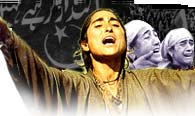

 |  |
| HOME | NEWS | SPECIALS | BLOOD IN THE SNOW | BITTER MEMORIES

Qadir, 29, wanted to internationalise the Kashmir issue. The gun was his medium I was 19 when I crossed over. Five years later when they arrested me, I was the Baramulla district commander of Al-Jihad. Those days the administration and the police were harassing us. They claimed we were all militants. But we weren't. Not at that point of time. When their atrocities increased, I crossed the border to Azad Kashmir with four others. We were trained to use all sorts of weapons there... SLRs, Kalashnikovs, grenades. We returned to the valley after a month. We didn't want to kill anyone. All we wanted was to reach our voice to the outside world. And the gun was our medium. That was a time when every house was our office. There was no one outside the movement. The reality about Kashmir is that it is disputed territory. India says we are part of India and Pakistan says we are part of Pakistan. But nobody is asking us whom we belong to! Don't we have a say when it is our head that is on sale? The government here interpreted our demands in a different light. We were always ready for talks. The government kept saying it was ready for talks, but nobody approached us. Initially we used to fire only in self-defence. But they started torturing my friends and family. The first time was in 1989. After that, naturally, I couldn't have love for them, could I? We really got down to violence. We made good use of the gun. You ask me how many encounters I have been in? I can't say. There were too many. We used to have encounters every morning and evening. The first few times, I used to feel frightened. The guy I was shooting at had a gun. Moreover he was in uniform. He was also, like me, some mother's son. But as time progressed that feeling changed. Because they unleashed atrocities on our people. I was arrested in Srinagar. No, it was not an encounter. I didn't have a weapon on me. I was on my way somewhere with another boy when our vehicle broke down. We gave it for repair and were just walking down the road when two-three vehicles screeched to a stop. An informer identified me. Luckily, my colleague escaped. They blindfolded me and took me to, I think, the old airport. For the next five days they tortured me. Electric shocks, rollers... fed me bad food, would allow just two minutes in the toilet, made me sit on heated stools... I was released in 1997. There was a lot of pressure from my family when I came out. They had gone through hell. Many of my family members had migrated because of what I had brought on them. When I saw how much my actions had affected my family, I couldn't bring myself to return to militancy. The security personnel still harass me. They call us every week, once, twice, thrice... They still use third degree methods. There is no one to hear our voice even today. History says that the English did a lot of atrocities in India. But I say the Indians are worse than the British. What they do here in Kashmir is worse. There's full support to militancy even now. You tear the chest of any Kashmiri and look into his heart. You will see he's no friend of India. But he cannot say that aloud now. In the background the factory is still functioning. It is gulping down raw material in the form of youths and spitting out finished products. Many of my friends have been killed by my side. People whom I used to go to college with. People I used to play with... We don't want the gun here. We want peace. Leave us alone. Leave Kashmir alone. Let us manage our affairs ourselves. If we want help from India tomorrow we will ask for it. That goes for Pakistan too. We do not want to fight either country. Just let us be. We will manage.
Interviewed by Chindu Sreedharan 'Blood is no solution'' | Back The Kashmiris | |||||||||||||||||||||||||||||||||||||||||